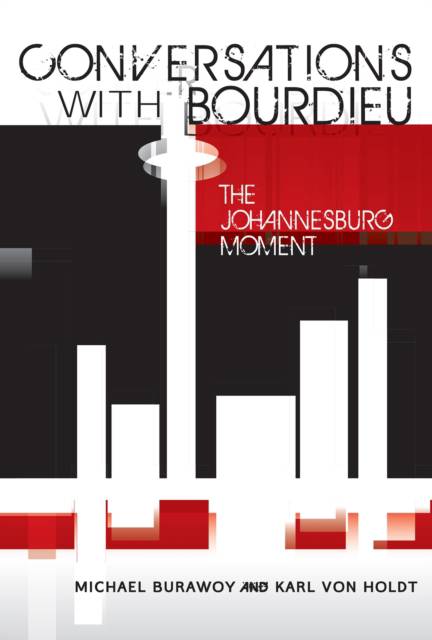
- Afhalen na 1 uur in een winkel met voorraad
- Gratis thuislevering in België vanaf € 30
- Ruim aanbod met 7 miljoen producten
- Afhalen na 1 uur in een winkel met voorraad
- Gratis thuislevering in België vanaf € 30
- Ruim aanbod met 7 miljoen producten
Zoeken
Conversations with Bourdieu
The Johannesburg Moment
Michael Burawoy, Karl Von Holdt
Paperback | Engels
€ 39,45
+ 78 punten
Omschrijving
Pierre Bourdieu (1930-2002) is the most influential sociologist of our time. His works take in education, culture, sport, literature, painting, class, philosophy, religion, law, media, intellectuals, methodology, photography, universities, colonialism, kinship, schooling and politics. Not much remains outside Bourdieu's sociological eye. His works are widely read across disciplines and he was one of the most prominent public intellectuals in France. Conversations with Bourdieu presents the first comprehensive attempt at a critical engagement with Bourdieu's theory as a totality. Michael Burawoy constructs a series of imaginary conversations between Bourdieu and his nemesis - Marxism - from which he silently borrowed so much. Starting with Marx, and proceeding through Gramsci, Fanon, Freire, de Beauvoir, and Mills, Burawoy takes up the challenge Bourdieu presents to Marxism, simultaneously developing a critique of Bourdieu and a reconstruction of Marxism. Karl Von Holdt, in turn, brings these conversations to South Africa, showing the relevance of Bourdieu's ideas to a country he never visited. Armed with Bourdieu, Von Holdt takes up some of the most pressing social and political issues of contemporary South Africa: the relation between symbolic and real violence, the place of intellectuals in public life, the intervention of gender in politics, the grappling with race, the critique of education, the importance of habitus, the history and future of class mobilisation, and the legacy of the liberation struggle. Conversations with Bourdieu pioneers a distinctive approach to doing social theory that is neither a combat sport nor an artificial synthesis, but a way of pushing theory to its limits through dialogue - dialogue between theorists and dialogue between theory and the world it represents. The book is distinctive too in pointing towards a new global sociology consciously rooted in a dialogue between the social realities and theoretical perspectives of North and South. The conversations were first presented as Mellon Lectures at the University of the Witwatersrand, Johannesburg in 2010
Specificaties
Betrokkenen
- Auteur(s):
- Uitgeverij:
Inhoud
- Aantal bladzijden:
- 248
- Taal:
- Engels
Eigenschappen
- Productcode (EAN):
- 9781868145409
- Verschijningsdatum:
- 1/02/2012
- Uitvoering:
- Paperback
- Formaat:
- Trade paperback (VS)
- Afmetingen:
- 147 mm x 218 mm
- Gewicht:
- 340 g

Alleen bij Standaard Boekhandel
+ 78 punten op je klantenkaart van Standaard Boekhandel
Beoordelingen
We publiceren alleen reviews die voldoen aan de voorwaarden voor reviews. Bekijk onze voorwaarden voor reviews.







